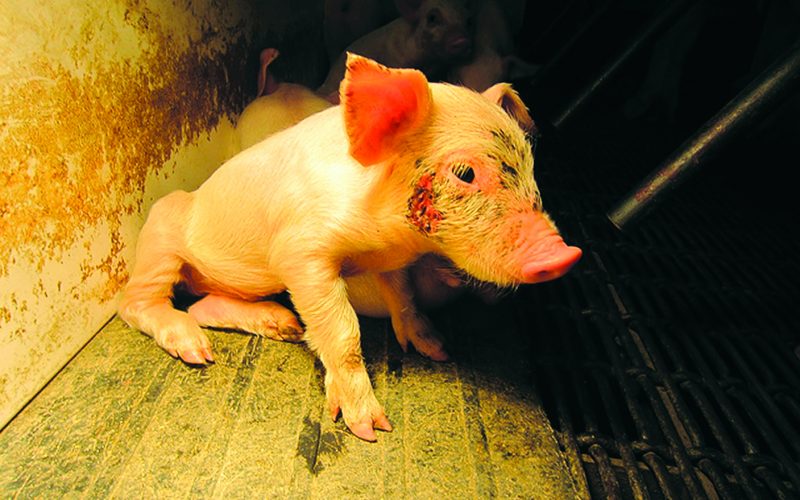By Terrah Baker
Ya’ know what I love? I love a good hot dog on the Fourth of July, bacon with my eggs in the morning and Italian sausage in my garlic and olive spaghetti sauce. The problem: I also love pigs.
“Sure,” some will say. “How can you love a pig? It’s just an animal and it’s meant to be food.” I respect that response. But, I also respect pigs as fellow creatures with nerve-endings, a sense of fear, contentment and pain. Scientists have shown that pig skin and organs are very similar to humans, which is why they’ve used them in experiments to recreate failed human organs.
So why, if we’re so similar in structure and make-up, would we put these fellow creatures through short, cramped, painful, horrendous lives and deaths? Well…they taste good, and produced in this way, it’s cheap.

Photo By Mercy For Animals
In July, an undercover investigation by Mercy For Animals exposed animal abuse at a major Walmart pork supplier in Iowa. This image of injured piglets is one of the less grotesque images that have come out of that investigation and more, in attempts to show the American people the filth and torture that is the factory-produced meat industry.
But is it worth it?
That’s the question Gary Smith of Mercy For Animals has been asking Walmart executives at organized protests in Bentonville and Fort Smith. It’s also the question I had to ask myself after watching the 2010 documentary Vegucated, written and directed by Marisa Miller Wolfson. Like me, and millions of Americans, she grew up eating meat without making the connection from the real-life, living, breathing creature to the lifeless salty, tender morsel that was on her plate.
But also like me, and a growing number of Americans, she just couldn’t look at a piece of meat the same after witnessing the images of horror experienced by animals; or the positive health effects people see after cutting meat from their diets. I won’t go into details here, as a lot has been exposed, but suffice it to say humans can do better than a system of torture, filth and bad health.
It wasn’t the scare tactics that worked for Vegucated; mainly it was entertaining to watch three average Americans try to become vegan and learn about the meat and dairy industry. But for groups like Mercy For Animals, getting attention is what they must do when going up against one of the world’s largest retailers.
Take for instance the large inflatable pig they used at the protest outside the Fort Smith Walmart on Rogers Ave., Ste. 101J held Feb. 12. They told Walmart their pork suppliers practice of confining pregnant sows to small gestation crates for most of their lives can no longer be tolerated.
In July, an undercover investigation by Mercy For Animals exposed animal abuse at a major Walmart pork supplier, however, Walmart has refused to follow the lead of retailers like Costco, Kroger and Safeway, all of whom have agreed that gestation crates are inherently cruel.
So, after watching Vegucated, and seeing the photos distributed by Mercy For Animals, (and years of contemplation) I have officially pledged to never order or buy factory-produced meat again (on purpose), and to finally release myself from the guilt of a system that’s bad for animals, farmers and consumers.
The greatest thing about not eating factory-produced meat is knowing if the bad system is no longer profitable, a new, better system can begin to form. According to Vegucated, it will also allow me to reduce more emissions in one year than changing to a Hybrid vehicle. And I’ll actually save money and get healthy, too!
To learn about the movie, visit www.GETVEGUCATED.com. To participate in
future protests against the mistreatment of pregnant pigs, visit www.mercyforanimals.org. Remember, research and knowledge about a proper diet is essential to a vegetarian/vegan lifestyle. Do your research!



